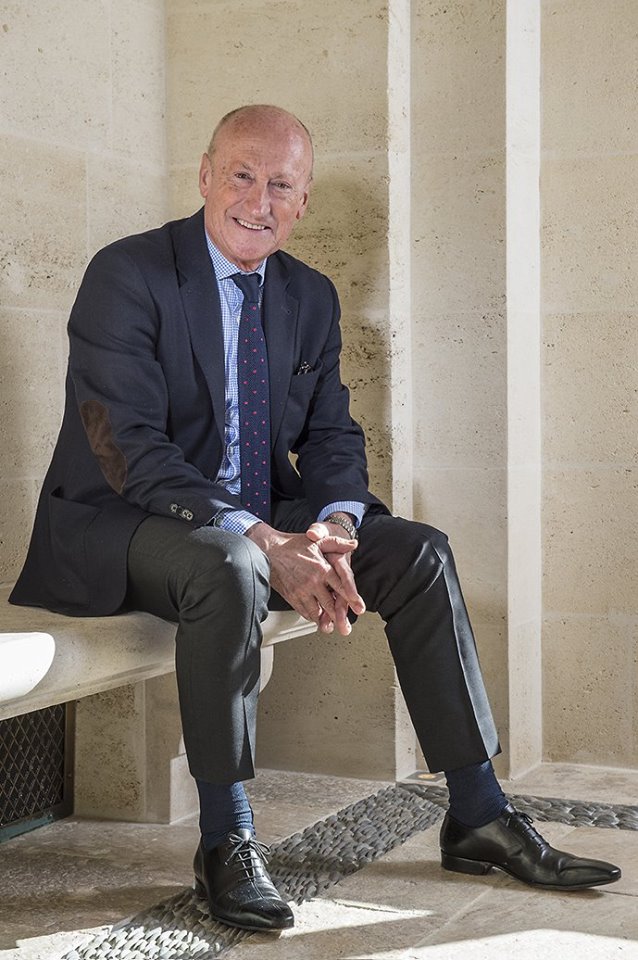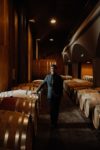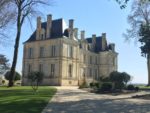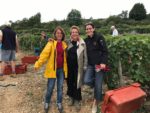The wines of Château Montrose will (soon) be organic!
 As part of its global approach to reducing its carbon footprint, the famous Grand Cru Classé of Saint-Estèphe is converting to organic farming. Its objective is to be a model vineyard in terms of eco-responsibility in 10 years. This ecological awareness is also accompanied by other projects such as mass selection, 100% electric tractors and the use of drones!
As part of its global approach to reducing its carbon footprint, the famous Grand Cru Classé of Saint-Estèphe is converting to organic farming. Its objective is to be a model vineyard in terms of eco-responsibility in 10 years. This ecological awareness is also accompanied by other projects such as mass selection, 100% electric tractors and the use of drones!
Organic farming at Château Montrose, a great ambition for the future …
” Château Montrose has recently intensified its environmental approach to accompany the field towards the total control of its ecological footprint. We want, within five years, to convert the vineyard to organic farming or biodynamics. At present we are running parallel to these two models. This is an approach that is not without risk, but we are committed to it by conviction.
 We decided to include these trials in a global approach because the vine is not the only thing with which to be concerned. We have developed a green energy site (geothermal and photovoltaic) that allows us to cover most of our needs. For example, geothermal energy allows us to cover the electricity needs of air conditioning in all buildings as well as the thermoregulation of tanks.
We decided to include these trials in a global approach because the vine is not the only thing with which to be concerned. We have developed a green energy site (geothermal and photovoltaic) that allows us to cover most of our needs. For example, geothermal energy allows us to cover the electricity needs of air conditioning in all buildings as well as the thermoregulation of tanks.
The estate of Montrose is not only planted in vines. We also have forested / vegetation areas, streams, forests … all of which contribute to preserving our ecosystem.
Bio is a practice, a technique, but also a philosophy to which we do not adhere by fashion, but by real conviction, with the will to work closer to nature. Before we embarked on this process, we had always been very attentive to our vineyard and its ecosystem.
We are intensifying this listening by using organic agriculture – mainly based on the preventive approach – and biodynamics, whereby we will concentrate on the underground, the soil and the root. The objective is, within 5 years, to convert the whole vineyard. ”
Would you like AB certification or biodynamics?
” Certification is not the only goal, but I think that, in the end, it will be indispensable. Given the context, the only thing that matters for now is to affirm our real and sincere commitment to this approach. ”
 Did the organic approach change anything in the wine?
Did the organic approach change anything in the wine?
” We started this year to vinify the different test plots separately in order to be able to compare. The first tastings (blind) are rather encouraging. Now we have to wait and see how this evolves. We will draw conclusions after breeding vines! ”
Soon 100% electric tractors in the vineyards of Montrose
“To extend this approach we are investing in 100% electric tractors. They have less impact on our environment but they are also perfectly adapted to the work of the vineyard. They are 40% lighter than normal tractors. This reduction allows us to limit the compaction of the soil. We are working on this project in collaboration with a young company established until now only in Champagne. Our objective is to convert the whole of our fleet into an electric fleet within 5 to 10 years. From my point of view, this response to the environmental problems corresponds more to the requirements of the 21st century than the reinsertion of the horse in the vines.
For the past two years we have also been working with drones that allow us to better understand the behavior of the vine and the vigor of the plant on the plot. This tool helps us to have a 3D view of our vineyard.”
Vines selection (massal) … a study whose objective is “to demonstrate that Montrose can only be produced at Montrose“
 “In Montrose, we have the advantage of having a historic vineyard. We were able to identify a whole series of healthy rootstock with interesting strains (DNA) with high potential and very representative of the property. Our goal is to be able to select and multiply them. As part of a 15-year project, we wish to continue to develop this mass selection and studies so that we can then replant. This will also enable us to prove that there is indeed a genetic heritage peculiar to Montrose that constitutes its identity, the singularity of its wines and thus demonstrate that Montrose can only be produced at Montrose. So we are planning to create a ‘nursery’ in the near future …. A real rarity, because there are very few vineyards that have embarked on mass selection. This requires meeting certain criteria, the main one being to own an old vineyard … ”
“In Montrose, we have the advantage of having a historic vineyard. We were able to identify a whole series of healthy rootstock with interesting strains (DNA) with high potential and very representative of the property. Our goal is to be able to select and multiply them. As part of a 15-year project, we wish to continue to develop this mass selection and studies so that we can then replant. This will also enable us to prove that there is indeed a genetic heritage peculiar to Montrose that constitutes its identity, the singularity of its wines and thus demonstrate that Montrose can only be produced at Montrose. So we are planning to create a ‘nursery’ in the near future …. A real rarity, because there are very few vineyards that have embarked on mass selection. This requires meeting certain criteria, the main one being to own an old vineyard … ”
Let’s talk about the Château Montrose wine: What makes it possible to recognize the wines of the estate in blind tasting?
“Blind tasting is always very complicated. What characterizes Montrose is controlled power, as a kind of wise lion. Everything is precise, including a powerful, elegant and fine tannic expression. Another “indicator” appears on our wines after a few years: a slight salinity. We do not know precisely what it is due to … perhaps on the ground, because the situation of the vineyard is not too high compared to the Garonne which is close to the sea, or the winds of the North West bringing the freshness of the Ocean? In the end, even if we do not know the origin of this salinity, we must note that it participates in the gourmet side of the wines of Montrose.
On the nose, the wine has a very small iodized side, very characteristic. Many wine estates are close to the water, but Montrose is really at the edge of the estuary and very north of the Médoc. We benefit from this influence of the ocean.
 The complexity of the aging bouquet is quite extraordinary: the more aged the wine, the more its aromatic palette expresses the identity and the richness of the Montrose terroir.
The complexity of the aging bouquet is quite extraordinary: the more aged the wine, the more its aromatic palette expresses the identity and the richness of the Montrose terroir.
Here is a little anecdote to illustrate what I’m saying: we participated with the ISVV (Scientific Institute of Vine and Wine) to do a study on the composition of the wine aging bouquet. This study on 10 vintages (1995 to 2005) revealed that our wines had a real typicity, characteristic of the greatest Bordeaux wines.”
“Our approach to the land of Montrose is to protect, to understand and to reveal on a daily basis the immensity of its potential” (Vincent Decup, Cellar Master)
To finish do you have any anecdotes to tell us about the property?
“… my favorite, concerns the nickname” Latour de Saint-Estèphe “, often given to Montrose in the world of wine … probably due to the rather similar positioning of the vineyards in relation to the Garonne and the nature of the soil. There are also similarities in the characters of wines, such as tannic power and timber framing. “(Hervé Berland, Manager / CEO of Château Montrose)
Thanks to Hervé Berland, Hélène Brochet and Vincent Ducup for their warm welcome.
Jonathan Choukroun Chicheportiche
Château Montrose
33180 Saint-Estèphe
+33(0)5.56.59.30.12





